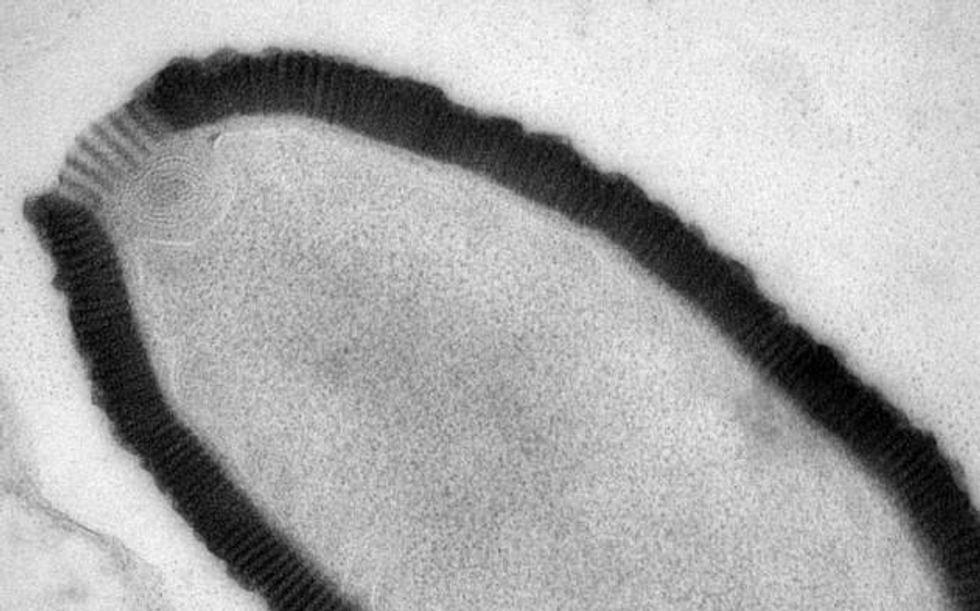

SUBSCRIBE TO OUR FREE NEWSLETTER
Daily news & progressive opinion—funded by the people, not the corporations—delivered straight to your inbox.
5
#000000
#FFFFFF
To donate by check, phone, or other method, see our More Ways to Give page.


Daily news & progressive opinion—funded by the people, not the corporations—delivered straight to your inbox.

Husband and wife evolutionary biologists Jean-Michel Claverie and Chantal Abergel have revived a giant virus trapped in 30,000 Siberian permafrost, according to research published in Monday's print issue of Proceedings of the National Academy of Sciences.
After learning that a team of Russian scientists had resurrected an ancient plant from fruits buried in Siberian permafrost, Claverie and Abergel were compelled to see if it was possible to revive a virus, said Claverie. Using permafrost samples provided by the Russian team, the pair "fished for giant viruses by using amoebae--the typical targets of these pathogens--as bait," the journal Nature reports. "The amoebae started dying, and the team found giant-virus particles inside them."
The revival of the "ancestral amoeba-infecting virus," the research abstract notes, "suggests that the thawing of permafrost either from global warming or industrial exploitation of circumpolar regions might not be exempt from future threats to human or animal health."
Responding to the study, Curtis Suttle, a virologist at the University of British Columbia in Vancouver, Canada--who was not involved in the work--cautioned that the projected impact on human health by an ice-thawed virus "stretches scientific rationality to the breaking point." He added, "I would be much more concerned about the hundreds of millions of people who will be displaced by rising sea levels."
_____________________
Dear Common Dreams reader, The U.S. is on a fast track to authoritarianism like nothing I've ever seen. Meanwhile, corporate news outlets are utterly capitulating to Trump, twisting their coverage to avoid drawing his ire while lining up to stuff cash in his pockets. That's why I believe that Common Dreams is doing the best and most consequential reporting that we've ever done. Our small but mighty team is a progressive reporting powerhouse, covering the news every day that the corporate media never will. Our mission has always been simple: To inform. To inspire. And to ignite change for the common good. Now here's the key piece that I want all our readers to understand: None of this would be possible without your financial support. That's not just some fundraising cliche. It's the absolute and literal truth. We don't accept corporate advertising and never will. We don't have a paywall because we don't think people should be blocked from critical news based on their ability to pay. Everything we do is funded by the donations of readers like you. Will you donate now to help power the nonprofit, independent reporting of Common Dreams? Thank you for being a vital member of our community. Together, we can keep independent journalism alive when it’s needed most. - Craig Brown, Co-founder |

Husband and wife evolutionary biologists Jean-Michel Claverie and Chantal Abergel have revived a giant virus trapped in 30,000 Siberian permafrost, according to research published in Monday's print issue of Proceedings of the National Academy of Sciences.
After learning that a team of Russian scientists had resurrected an ancient plant from fruits buried in Siberian permafrost, Claverie and Abergel were compelled to see if it was possible to revive a virus, said Claverie. Using permafrost samples provided by the Russian team, the pair "fished for giant viruses by using amoebae--the typical targets of these pathogens--as bait," the journal Nature reports. "The amoebae started dying, and the team found giant-virus particles inside them."
The revival of the "ancestral amoeba-infecting virus," the research abstract notes, "suggests that the thawing of permafrost either from global warming or industrial exploitation of circumpolar regions might not be exempt from future threats to human or animal health."
Responding to the study, Curtis Suttle, a virologist at the University of British Columbia in Vancouver, Canada--who was not involved in the work--cautioned that the projected impact on human health by an ice-thawed virus "stretches scientific rationality to the breaking point." He added, "I would be much more concerned about the hundreds of millions of people who will be displaced by rising sea levels."
_____________________

Husband and wife evolutionary biologists Jean-Michel Claverie and Chantal Abergel have revived a giant virus trapped in 30,000 Siberian permafrost, according to research published in Monday's print issue of Proceedings of the National Academy of Sciences.
After learning that a team of Russian scientists had resurrected an ancient plant from fruits buried in Siberian permafrost, Claverie and Abergel were compelled to see if it was possible to revive a virus, said Claverie. Using permafrost samples provided by the Russian team, the pair "fished for giant viruses by using amoebae--the typical targets of these pathogens--as bait," the journal Nature reports. "The amoebae started dying, and the team found giant-virus particles inside them."
The revival of the "ancestral amoeba-infecting virus," the research abstract notes, "suggests that the thawing of permafrost either from global warming or industrial exploitation of circumpolar regions might not be exempt from future threats to human or animal health."
Responding to the study, Curtis Suttle, a virologist at the University of British Columbia in Vancouver, Canada--who was not involved in the work--cautioned that the projected impact on human health by an ice-thawed virus "stretches scientific rationality to the breaking point." He added, "I would be much more concerned about the hundreds of millions of people who will be displaced by rising sea levels."
_____________________